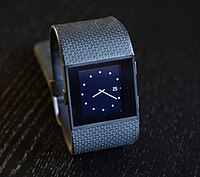
Photo from wikipedia
Background Weight loss interventions using mobile phone apps have recently shown promising results. Objective This study aimed to analyze the short-term weight loss effect of a mobile coaching intervention when… Click to show full abstract
Background Weight loss interventions using mobile phone apps have recently shown promising results. Objective This study aimed to analyze the short-term weight loss effect of a mobile coaching intervention when it is integrated with a local public health care center and a regional hospital’s antiobesity clinic as a multidisciplinary model. Methods A total of 150 overweight or obese adults signed up to complete an 8-week antiobesity intervention program with human coaching through a mobile platform. Paired t tests and multiple linear regression analysis were used to identify the intervention factors related to weight change. Results Among the 150 participants enrolled in this study, 112 completed the 8-week weight loss intervention. Weight (baseline: mean 77.5 kg, SD 12.9; after intervention: mean 74.8 kg, SD 12.6; mean difference −2.73 kg), body mass index, waist circumference, fat mass (baseline: mean 28.3 kg, SD 6.6; after intervention: mean 25.7 kg, SD 6.3; mean difference −2.65 kg), and fat percentage all showed a statistically significant decrease, and metabolic equivalent of task (MET) showed a statistically significant increase after intervention. In multiple linear regression analysis, age (beta=.07; P=.06), △MET (beta=−.0009; P=.10), number of articles read (beta=−.01; P=.04), and frequency of weight records (beta=−.05; P=.10; R2=0.4843) were identified as significant factors of weight change. Moreover, age (beta=.06; P=.03), sex (female; beta=1.16; P=.08), △MET (beta=−.0009; P<.001), and number of articles read (beta=−.02; P<.001; R2=0.3728) were identified as significant variables of fat mass change. Conclusions The multidisciplinary approach, combining a mobile health (mHealth) care app by health care providers, was effective for short-term weight loss. Additional studies are needed to evaluate the efficacy of mHealth care apps in obesity treatment.
Journal Title: JMIR mHealth and uHealth
Year Published: 2020
Link to full text (if available)
Share on Social Media: Sign Up to like & get
recommendations!